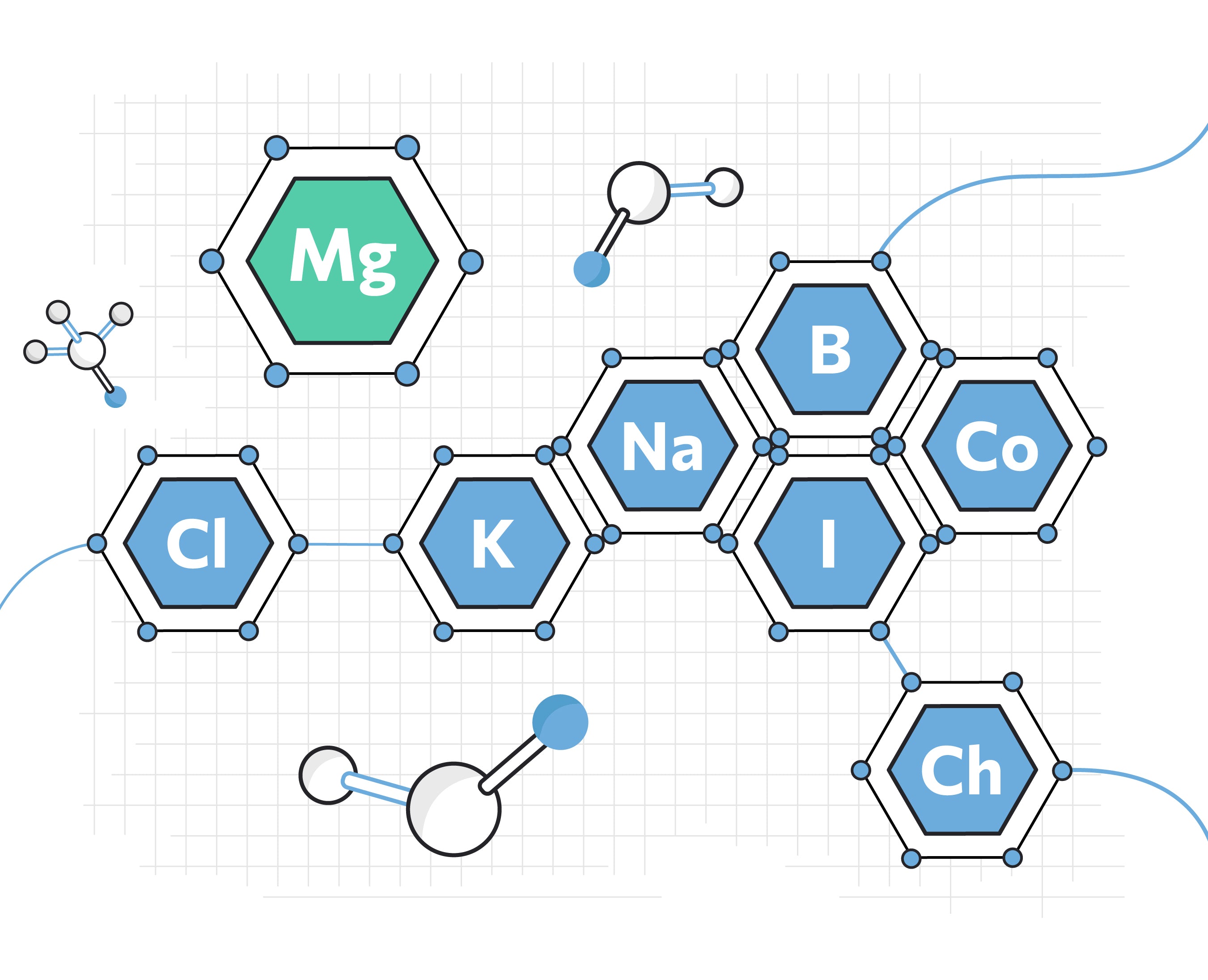
WHAT ARE MINERALS?
Minerals are inorganic elements found in nature, often in rocks, soil, and water, and they can be absorbed by plants and animals. They are naturally occurring substances, often in the form of salts or compounds, that can be found in the earth's crust. These substances enter our bodies through the food we eat and the water we drink.
In the context of biology and nutrition, minerals are part of the broader category of nutrients, but they differ from vitamins, proteins, fats, and carbohydrates, which are organic compounds. Minerals do not provide energy directly, but they are fundamental components of the substances that make up the body, like bones, teeth, and tissues. They are present in varying amounts in different foods, and their intake is essential for maintaining various aspects of physical well-being.

ESSENTIAL MINERALS
Our body can make many nutrients from sugars like glucose, proteins and fats. We cannot make some nutrients that are deemed essential, so they must be present in our diet. In this elite group of nutrients we can include the 9 essential amino acids, certain fats, vitamins and minerals.
Essential minerals are divided into two categories: macrominerals and trace minerals. In the first group we can find minerals like potassium, magnesium, etc. We need these minerals in larger quantities with your daily requirement ranging from 420mg of magnesium to an RDI of over 3000 mg for potassium. Trace minerals on the other hand, here is not nearly as much research on the are required in incredibly small quantities that we need of each. In this category we can find iodine, iron, etc. Here, it is important to recognize that they are vital to your health, even though you only need a small amount.

MINERALS WORK AS A TEAM
Minerals work best as a team, not in isolation. Because of this, mineral supplements with fewer varieties of minerals fall short.
Why? When the body receives only one or two, it must draw from its reserves to meet the demand, leading to demineralization. For example, a magnesium supplement may provide enough magnesium, but the body depletes calcium, phosphorus, or zinc to let it do its job. Limited supplements disrupt metabolic efficiency and cause nutrient imbalances over time.
OmniBlue’s 70+ mineral complex is sourced entirely from natural origins, ensuring that the minerals are delivered in their most bioavailable forms, as nature intended, without artificial additives or synthetic compounds.
THE LAW OF THE LIMITING NUTRIENT
This principle suggests that no matter how abundant other nutrients are, if one essential nutrient is deficient, it can limit the overall performance and health of the body. In human nutrition, this means that a deficiency in one mineral can hinder the functions of other nutrients and disrupt overall bodily functions, even if all other nutrients are present in adequate amounts.

REPLENISH THEM ALL OR LOSE IT ALL
- Interconnected Roles of Minerals: Minerals often work together. For instance, calcium and magnesium must be balanced for proper muscle function. If magnesium is deficient, it can lead to muscle cramps and cardiovascular issues, even if calcium is plentiful. Similarly, iron and copper work together in the production of hemoglobin. A deficiency in one can affect the other’s function, leading to anemia and reduced oxygen transport.
- Compensation and Depletion: When the body lacks a particular mineral, it may attempt to compensate by using other resources, leading to depletion of those resources. For example, if the body is low on calcium, it may start to draw calcium from bones, leading to osteoporosis over time. This depletion can weaken the entire system, making it more susceptible to further deficiencies and health issues.
- Cumulative Effects: Small deficiencies can have cumulative effects over time. For instance, a mild iodine deficiency might not cause immediate problems, but over time it can lead to thyroid dysfunction, resulting in symptoms like fatigue, weight gain, and cognitive impairment. These symptoms can then affect other areas of life, leading to a decline in overall health and well-being.
- Systemic Impacts: Over time, a small deficiency can lead to systemic issues. For instance, a chronic deficiency in magnesium can lead to issues such as hypertension, arrhythmias, and insulin resistance. These conditions can have widespread effects on cardiovascular health, metabolic function, and overall disease risk.

